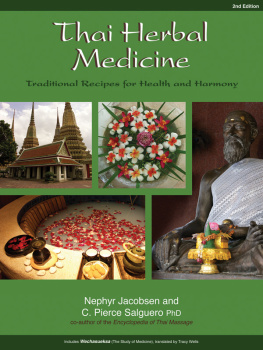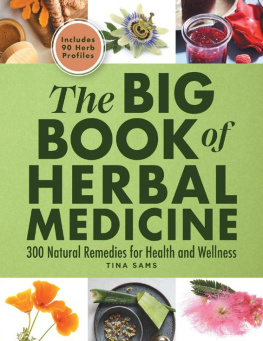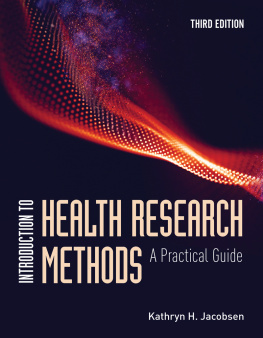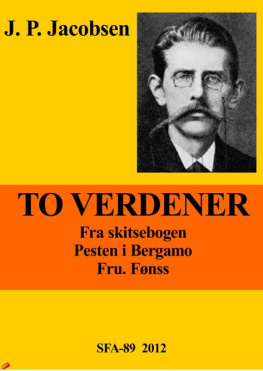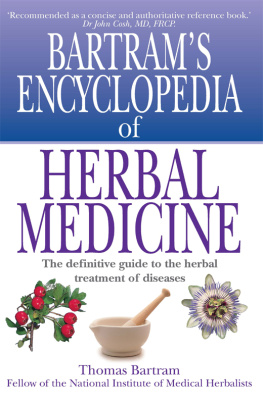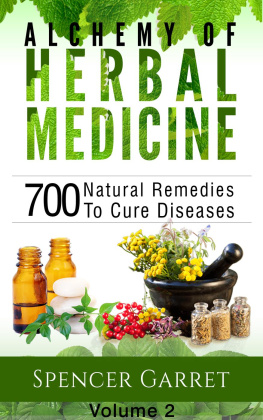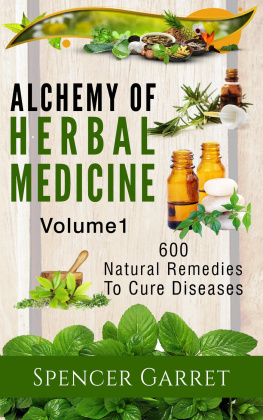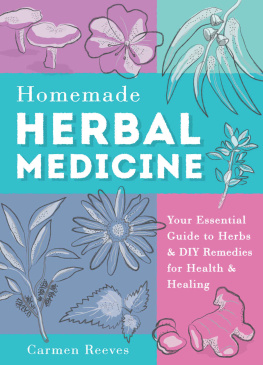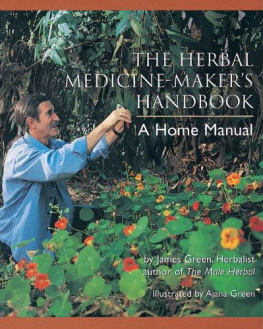Nephyr Jacobsen - Thai Herbal Medicine
Here you can read online Nephyr Jacobsen - Thai Herbal Medicine full text of the book (entire story) in english for free. Download pdf and epub, get meaning, cover and reviews about this ebook. year: 2014, publisher: Findhorn Press, genre: Home and family. Description of the work, (preface) as well as reviews are available. Best literature library LitArk.com created for fans of good reading and offers a wide selection of genres:
Romance novel
Science fiction
Adventure
Detective
Science
History
Home and family
Prose
Art
Politics
Computer
Non-fiction
Religion
Business
Children
Humor
Choose a favorite category and find really read worthwhile books. Enjoy immersion in the world of imagination, feel the emotions of the characters or learn something new for yourself, make an fascinating discovery.
- Book:Thai Herbal Medicine
- Author:
- Publisher:Findhorn Press
- Genre:
- Year:2014
- Rating:4 / 5
- Favourites:Add to favourites
- Your mark:
- 80
- 1
- 2
- 3
- 4
- 5
Thai Herbal Medicine: summary, description and annotation
We offer to read an annotation, description, summary or preface (depends on what the author of the book "Thai Herbal Medicine" wrote himself). If you haven't found the necessary information about the book — write in the comments, we will try to find it.
Thai Herbal Medicine — read online for free the complete book (whole text) full work
Below is the text of the book, divided by pages. System saving the place of the last page read, allows you to conveniently read the book "Thai Herbal Medicine" online for free, without having to search again every time where you left off. Put a bookmark, and you can go to the page where you finished reading at any time.
Font size:
Interval:
Bookmark:
Thai Herbal Medicine
Traditional Recipes for Health & Harmony
Second Edition
Other books by C. Pierce Salguero
Encyclopedia of Thai Massage, 2nd Edition

ISBN 978-1-84409-563-6
Thai Massage Workbook, 2nd edition

ISBN 978-1-84409-564-3
available from your local bookstore,
or directly from publisher at
www.findhornpress.com
Thai Herbal Medicine
Traditional Recipes for Health & Harmony
Nephyr Jacobsen
and
Dr. Pierce Salguero
with a contribution from
Tracy Wells

All materials unless otherwise attributed:
20032013 Nephyr Jacobsen, C. Pierce Salguero,
Appendix 1 Tracy Wells
All photography 19972012 C. Pierce Salguero
The rights of Nephyr Jacobsen and C. Pierce Salguero to be identified as the authors of this work have been asserted by them in accordance with the Copyright, Designs and Patents Act 1998.
First published by Findhorn Press 2003. Second edition, fully revised and updated, published by Findhorn Press 2013.
ISBN: 978-1-84409-627-5
All rights reserved. The contents of this book may not be reproduced in any form, except for short extracts for quotation or review, without the written permission of the publisher.
British Library Cataloguing-in-Publication Data.
A catalogue record for this book is available from the British Library.
Edited by Nicky Leach
Cover design by Richard Crookes
Interior design by Damian Keenan
Printed and bound in USA
Published by
Findhorn Press
117-121 High Street,
Forres IV36 1AB Scotland,
United Kingdom
t +44-(0)1309-690582
f +44(0)131-777-2711
e
www.findhornpress.com
Important Note

T his book reports on the herbal medicine recommendations made in Traditional Thai Medicine (TTM) circles. Information has been compiled from many sources including historical Thai texts, contemporary research papers, personal instruction from TTM practitioners, Thai government sources, and traditional herbal lore. Many of the herbs in this collection are well known, but in most cases the therapeutic claims made in this book have not been evaluated by the Western professional herbalist community or Western food and drug governing bodies. We strongly emphasize that use of the herbs presented in this book, especially the non-culinary ones, be undertaken only by trained herbalists, with full knowledge of local laws and at your own risk.
Please understand that this text is not meant to replace formal training with a skillful instructor in the art and practice of traditional herbal medicine, nor should it replace consultation with a properly trained doctor when choosing a remedy for yourself or others. The inherent naturalness of herbs does not make them categorically safe. Even herbs that are benign to most people have the potential for allergic reaction in some, and all herbal medicine treatment should be taken with knowledge and awareness of the potential dangers. Extra care should be taken by anyone who is elderly, very young, pregnant, immunocompromised, or in a weakened state.
Traditionally, herbal medicine would be administered by a doctor who would remain in close contact with the patient, and who could make adjustments to the treatment as needed. Statements such as This herb is good for you, with the you being the generic population, are rare in TTM. The you in this sentence refers to a specific person with a specific Elemental imbalance. Many herbs may treat a condition; however, every herb is not right for every person. We implore you to use this book for informational purposes only, until you have adequate training and knowledge to evaluate your patients on an individual basis.
PREFACE
C. Pierce Salguero

W hen I initially compiled the information that would become the first edition of this book in the late 1990s, I was in my early twenties, living in Chiang Mai and just beginning to study many different aspects of Thai healing. Information in English on Traditional Thai Medicine was hard to come by in those days, and I had the vision to write a series of books to make what I was learningwhile I was learning itavailable to a general public that had little awareness of Thai traditions. The notes I was taking on Thai herbal medicine became the first volume in a series with Findhorn Press, which went on to include books on massage and spiritual healing traditions as well. Now, returning to these books after over 15 years of academic study of Asian medical traditions, I see clearly the enthusiasm of youth and the excitement of discovery on every page, and I remember those times in Chiang Mai fondly.
There is a timeless myth in traditional medical circles that true or authentic knowledge is to be found only in the earliest, most original text, and that later versions are corrupt, debased, or untrustworthy. In scholarly circles, however, we know the opposite to be true. We know that our collective scholarship deepens from generation to generation, that individual scholars become better informed over a lifetime study, and that any edition of a bookbut especially a first editionis always a snapshot of a work in progress.
While the second edition of this book is as much a work in progress as the first, it has improved considerably upon the previous versionso much so that, in my opinion, it should be considered a completely new book. The first edition was compiled from bits and pieces of information I was taught on an ad hoc basis by a wide range of herbalists, massage therapists, market sellers, and neighbors, as well as things I read in the books I had access to, on websites, and in tourist magazines. The second edition is informed by much deeper formal study. It has corrected a number of errors, misperceptions, and mistranslations in the first, and has included many other improvements, large and small. Where the first edition had no awareness of Thai medical history, this one does. Where the first introduced a single Taste system, this one introduces five. Where the first drew upon parallels and examples from Chinese, Indian, and Western herbal medicine, this one is confident enough to allow Thai medicine to stand on its own terms. The second edition also includes Thai script, Thai language resources in the bibliography, and includes an English translation of a Traditional Thai Medicine text.
If, indeed, this edition marks a great leap forward in the quality of the information on Thai medicine available in English, and if it improves so substantially upon the first, this is due only in small part to my own deepening knowledge. The majority of the credit must be given to my collaborators, Nephyr and Tracy. While in the years since the 1990s, I have left behind my studies of Thai medicine in favor of becoming a scholar of medical history, Nephyr has been diligently studying herbal medicine with a wide range of Thai practitioners. She has also accumulated a great amount of experience teaching these traditions herself, and so she brings to this book both her practical experience with the herbs as well as her natural, laid-back way of explaining how to use them. Tracy, on the other hand, is a translator who initially became interested in learning the language after studying Thai massage. She has recently begun to turn her attention to the arcane and difficult language of historical medical texts and has now completed the first English translation of a Thai medical text since the 1970s. I think you will agree that the contributions both Nephyr and Tracy are making to the community of Thai massage and medicine practitioners through their writings and translations are something for which we should all be grateful.
Next pageFont size:
Interval:
Bookmark:
Similar books «Thai Herbal Medicine»
Look at similar books to Thai Herbal Medicine. We have selected literature similar in name and meaning in the hope of providing readers with more options to find new, interesting, not yet read works.
Discussion, reviews of the book Thai Herbal Medicine and just readers' own opinions. Leave your comments, write what you think about the work, its meaning or the main characters. Specify what exactly you liked and what you didn't like, and why you think so.

